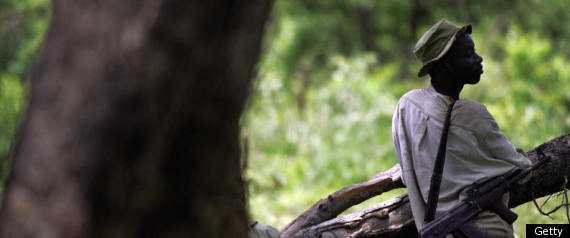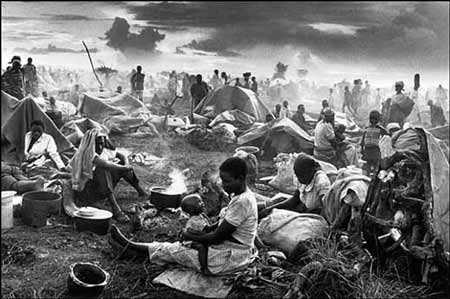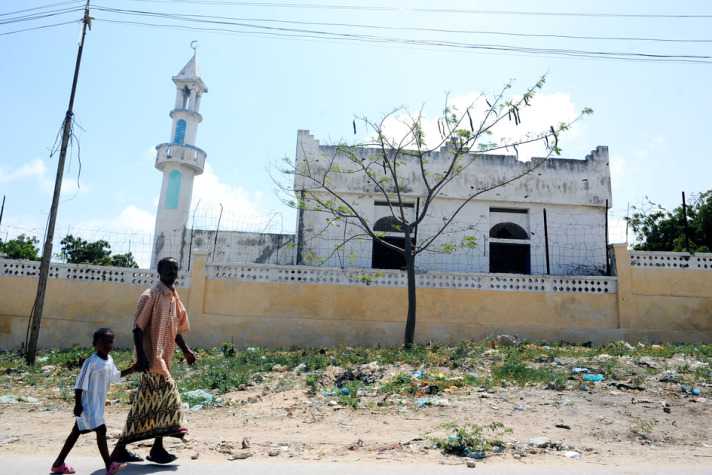By JASON STRAZIUSO
 NAIROBI, Kenya — Why is the U.S. sending its troops to finish off a fractured band of bush fighters in the middle of Africa? Political payback for the quiet sacrifices of Uganda’s troops in Somalia could be one reason.
NAIROBI, Kenya — Why is the U.S. sending its troops to finish off a fractured band of bush fighters in the middle of Africa? Political payback for the quiet sacrifices of Uganda’s troops in Somalia could be one reason.
President Barack Obama announced Friday he is dispatching about 100 U.S. troops – mostly special operations forces – to central Africa to advise in the fight against the Lord’s Resistance Army – a guerrilla group accused of widespread atrocities across several countries. The first U.S. troops arrived Wednesday.
Long considered one of Africa’s most brutal rebel groups, the Lord’s Resistance Army began its attacks in Uganda more than 20 years ago. But the rebels are at their weakest point in 15 years. Their forces are fractured and scattered, and the Ugandan military estimated earlier this year that only 200 to 400 fighters remain. In 2003 the LRA had 3,000 armed troops and 2,000 people in support roles.
But capturing LRA leader Joseph Kony – a ruthless and brutal thug – remains the highest priority for Ugandan President Yoweri Museveni, a 25-year-leader who has committed thousands of troops to the African Union force in Somalia to fight militants from al-Shabab, a group with ties from al-Qaida.
The U.S. has not had forces in Somalia since pulling out shortly after the 1993 Black Hawk Down battle in Mogadishu in which 18 American troops died.
Some experts believe that the U.S. military advisers sent to Uganda could be a reward for the U.S.-funded Ugandan troops service in Somalia.
“I’ve been hearing that. I don’t know if our group necessarily agrees with that, but it definitely would make sense,” said Matt Brown, a spokesman for the Enough Project, a U.S. group working to end genocide and crimes against humanity, especially in central Africa.
“The U.S. doesn’t have to fight al-Qaida-linked Shabab in Somalia, so we help Uganda take care of their domestic security problems, freeing them up to fight a more dangerous – or a more pressing, perhaps – issue in Somalia. I don’t know if we would necessarily say that but it’s surely a plausible theory,” Brown said.
Col. Felix Kulayigye, Uganda’s military spokesman, told The Associated Press previously that Ugandan forces have long received “invaluable” support from the U.S. military, including intelligence sharing, in the fight against the LRA.
That support got a huge boost this week.
Though the deployment of 100 troops is relatively small, it marks a possible sea-change for Washington in overcoming its reluctance to commit troops to Africa. Even the U.S. Africa Command, which oversees U.S. military operations on the continent, is based in Germany. The U.S. maintains a base in the tiny East African nation of Djibouti, but most troops there are not on combat missions.
The LRA poses no known security threat to the United States, and a report from the Enough Project last year said that Kony no longer has complete and direct command and control over each LRA unit.
But the group’s tactics have been widely condemned as vicious. Few are expected to object to Obama’s move to help regional security forces eliminate a group that has slaughtered thousands of civilians and routinely kidnaps children to be child soldiers and sex slaves.
Kony is wanted by the International Criminal Court for his group’s attacks, which now take place in South Sudan, Congo and the Central African Republic.
Still, Bill Roggio, the managing editor of The Long War Journal, called the Obama administration’s rationale for sending troops “puzzling,” especially since the LRA does not present a national security threat to the U.S. – “despite what President Obama said.”
“The timing of this deployment is odd, especially given the administration’s desire to disengage from conflicts in Iraq and Afghanistan,” Roggio said. “It is unclear why the issue has resurfaced, but the administration may be rewarding Uganda” for its military contributions in Somalia, he said.
Obama said that although the U.S. troops will be combat equipped, they will not engage LRA forces unless it is in self-defense.
In recent months, the administration has stepped up its support for Uganda. In June, the Pentagon moved to send nearly $45 million in military equipment to Uganda and Burundi, another country contributing in Somalia. The aid included four small drones, body armor and night-vision and communications gear and is being used in the fight against al-Shabab.
Last November, the U.S. announced a new strategy to counter the LRA’s attacks on civilians. U.S. legislation passed last year with huge bipartisan support calling for the coordination of U.S. diplomatic, economic, intelligence and military efforts against the LRA. That’s one reason, Brown said, Obama may be sending in advisers. He said that regional stability is also good for U.S. interests.
“It really doesn’t take that many U.S. resources,” Brown said. “You’ve got 100 troops to go in and take care of the LRA problem once and for all.”
__
Jason Straziuso has been AP’s bureau chief in East Africa since 2009.
www.huffingtonpost.com, 15.10.2011






